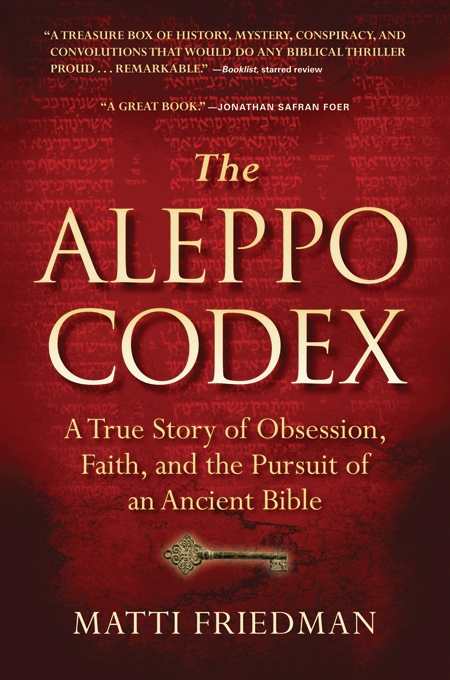The Aleppo Codex
A True Story of Obsession, Faith, and the Pursuit of an Ancient Book
The Aleppo Codex is part historical exposé, part international thriller, and part meditation on the passions awakened by religion and religious artifacts. In this book, Matti Friedman carefully outlines the epic journey of The Crown of Aleppo, the most perfect copy of the Jewish Torah. The Crown was inscribed in 930 AD by the scholar Aaron Ben-Asher and is thought to be the copy used by Maimonides, one of the great medieval Jewish philosophers. The significance of this book for Jewish scholars cannot be overstated; however, its story following the end of WWII is anything but simple.
For centuries The Crown was the cherished relic of the Jews of Aleppo, an ancient Jewish community in Syria. Following the unrest precipitated by the creation of Israel, The Crown disappeared, only to resurface in Jerusalem more than a decade later with a substantial portion of the codex missing. What happened to The Crown between its disappearance in Aleppo to its arrival in Israel varies wildly depending on who you ask: the Israeli government, members of the Aleppo diaspora, the cheese merchant charged with smuggling the document into Israel, and the officials who received The Crown in Jerusalem all tell a different, and sometimes contradictory, version of events. Friedman painstakingly guides readers through the labyrinth of misconception and propaganda surrounding The Crown, leading them to a conclusion worthy of the most shocking of spy thrillers.
The Aleppo Codex is superbly written, and Friedman’s experience as a correspondent for the Associated Press is evident in his coverage of a wide range of events and personalities. The pacing and structure are also excellent, with Friedman allowing the complicated story to unfold piece by piece, giving the reader the opportunity to appreciate the extent of drama and intrigue surrounding the ancient text. Friedman’s objective description of the diverse cast of characters who played a role in The Crown’s story offers insight into the variety of perspectives and motivations that led people to take the actions they did. Ultimately, however, the book that was “meant to serve humans as a moral compass” fell victim to the “tragedy of human weakness.” In the conclusion of The Aleppo Codex, Friedman muses that Maimonides might have grieved over the fate of The Crown but perhaps would not have been surprised to see the same vices described in the text itself represented by its human audience. The Crown “fell victim to the instincts it was created to temper and was devoured by the creatures it was meant to save,” concludes Freidman.
Reviewed by
Claire Posner
Disclosure: This article is not an endorsement, but a review. The publisher of this book provided free copies of the book to have their book reviewed by a professional reviewer. No fee was paid by the publisher for this review. Foreword Reviews only recommends books that we love. Foreword Magazine, Inc. is disclosing this in accordance with the Federal Trade Commission’s 16 CFR, Part 255.

